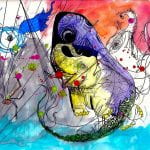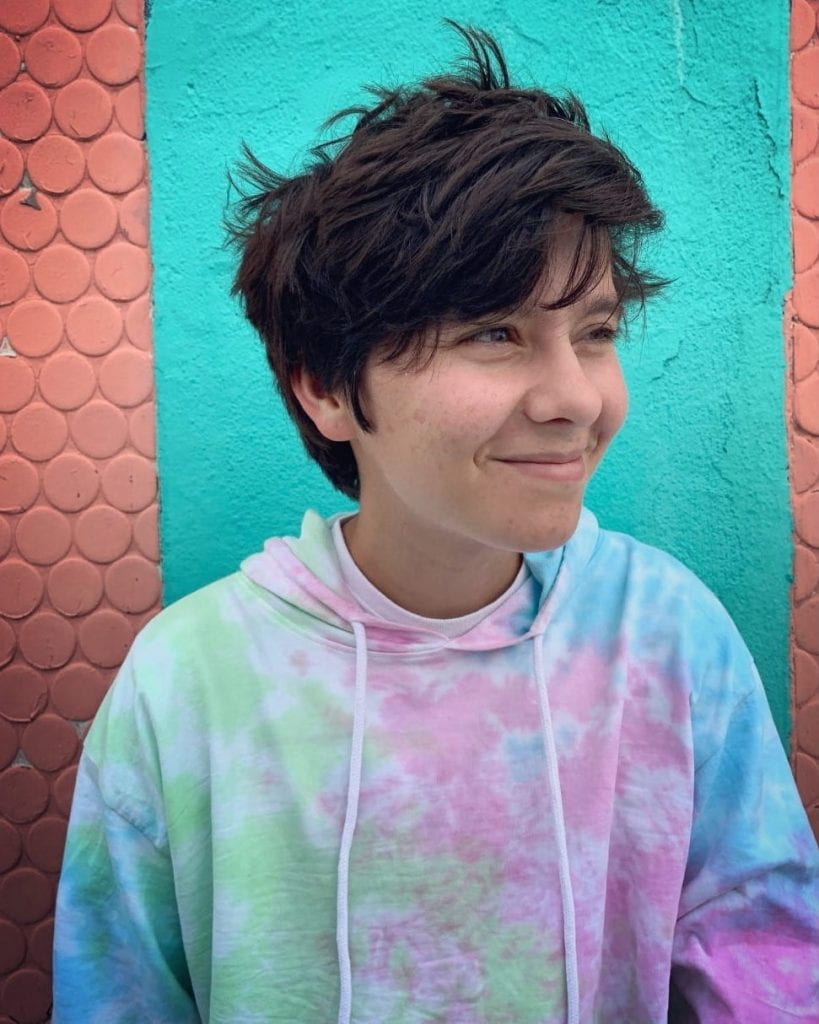By Ash Reed~
The Selection Committee for the 2019 Whiting Award had this to say about Kayleb Ray Candrilli’s most recent book, What Runs Over: “The most unsettling of lullabies, …Candrilli’s verse memoir unfolds with savage grace as it lays bare the violence and isolation of a trans person’s coming of age. It is a dazzling addition to literature about rural childhoods….their work feels as urgent and electric as a living thing.”
Before the prestigious 2019 Whiting Award for Poetry (an award granted to ten exceptionally talented emerging creative writers per year), before the 2018 Saturnalia Book Prize for All the Gay Saints, before being named 2015 Lambda Literary Emerging Fellow in Nonfiction and a 2017 Fellow in Poetry, Kayleb Rae Candrilli was winning writing awards right here at Penn State.
Candrilli’s “In and Out of the Oven: Six Narratives” won the English Department’s 2013 Edward J. Nichols Memorial Award for Fiction and was published in Kalliope 2013, Penn State’s creative arts journal, the sister journal to Klio.
Candrilli graduated from Penn State’s Schreyer’s Honors College with a B.A. in English and an M.A. in creative writing in 2014. Fun fact: Candrilli loved teaching so much during their time in the BA/MA program that they got an English 15 tattoo to commemorate their first semester of teaching here.
After Penn State, Candrilli moved on to the University of Alabama to earn their M.F.A in Creative Nonfiction and Poetry (2016), as well as an M.L.I.S in Library Science and Information Technology (2017).
Candrilli’s writing has been published in numerous literary magazines such as RHINO, Puerto de Sol, and Booth, to name a few.
They also served as the nonfiction editor of Black Warrior Review, the Assistant Poetry Editor of BOAAT Press from 2017–2018, as well as numerous other positions in various literary magazines.
I had the opportunity to ask Kayleb some questions over email about their thoughts on publishing in Kalliope and writing in general.
AR: Was your publication in Kalliope as an undergrad at Penn State your first publication as a writer? Do you remember what it felt like to see you work in print for the first time?
KRC: It was! I remember feeling excited, and committed to pursuing writing, but also deeply anxious. Which is much the same as it feels when I publish now.
There is such vulnerability in putting art forth into the world. But also, massive responsibility. The written word has always carried such weighty cultural and political influence and I think much of my anxiety when publishing, comes from a desire to better the world we are in. I try to practice a “do no harm” mentality when I make art, and the anxiety exists because until the work is public, you can’t be sure of the work’s effects.
AR: In the past, you have written and won awards for nonfiction, fiction, and poetry, but now you write mainly poetry. Do you think of poetry as your primary form of expression, and if so, what is it about poetry?
KRC: I think poetry has always been how I most effectively expressed myself, whether I knew it was poetry or not. But I think many things can be true at once.
Life is short, yes, but it is also long. I am working on a collection of essays now. I’m compiling an archival photobook and designing its layout. I dream about writing YA novels. And I’d love to collaborate with an artist on a graphic novel. It’s all poetry to me. It would be such a blessing to live a long time and just write.
AR: You graduated from Penn State from the BA/MA program in creative writing; how did that experience affect your writing and writing career?
KRC: The BA/MA program was integral in my growth as a writer. It was such a necessary year of development. I believe strongly that I would not have been admitted to graduate programs without that year of studies. But perhaps more importantly to me, the BA/MA program let me teach.
Which, almost immediately, I knew was all I wanted to do with my life. I even have an English 15 tattoo, to commemorate my time with my very first class. When I decided I wanted to teach, I was even more driven to write, knowing I would have to publish pretty prolifically to find my way into a classroom—and still on the academic job market, that has proven true.
AR: You have previously served as an editor for publications such as Black Warrior Review, NANO Fiction, and for Boaat Press. How did this impact you as a writer?
KRC: My time editing has made me a more empathetic person, I think. When editing BWR I was emotionally taxed by all the nonfiction I was reading every day. When you first start submitting, it may seem like you’re sending work into the void—shouting into a tunnel just to hear it echo back at you. But someone is on the other side of the submission.
I would read these incredible pieces and know we couldn’t accept them for publication, just not enough space. I’d be weeping at my computer, essay after essay. I think during my tenure with BWR we accepted around 10 non-fiction pieces, and I read around 1000 entries per semester. It stretches you, to hold so much at once. I think about so many essays, still, that I couldn’t accept.
I think too, editing, if done properly, can guide you in forging a political identity. It is an immense responsibility to be placed in a role of “taste-making.” How do you equitably and ethically divide labor, so that all the work you accept isn’t aesthetically and demographically monolithic? Whose work are you accepting? Whose stories are being heard? Who benefits from those narratives? Who is left out of the narratives? If you aren’t thinking about how to eradicate the race, gender, and income disparities in contemporary publishing, then you probably shouldn’t be an editor—at least not until you’re ready to do those things.
AR: Do you have any advice for aspiring writers?
KRC: When you write, ask yourself if the work will ethically hold up in 5 years, 10 years, 20 years? If the answer is no, or you feel unsure, come up with a new idea.
To keep up with Kayleb’s work, visit https://www.krcandrilli.com.

